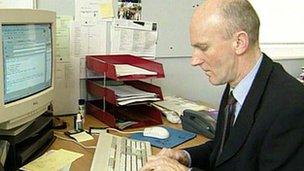Labour's Bob Ashford steps down as police candidate over conviction
- Published

Mr Ashford is barred from standing for the post due to a previous criminal conviction
The Labour Party candidate due to stand in the Avon and Somerset police commissioner election has stepped down due to a previous criminal conviction.
Bob Ashford, a former Frome councillor, said a crime he committed as a teenager bars him from standing for the post.
The Labour Party received clarification of the ruling from the Home Office and the Electoral Commission.
Mr Ashford said he was "unhappy" with the circumstances and wanted to apologise to his supporters.
In a statement on his website, external, Mr Ashford said that in 1966, aged 13, he was convicted of trespassing and being in possession of an offensive weapon.
He was fined £2, 10 shillings for both offences.
The Police Reform and Social Responsibility Act 2011 disqualifies a person from standing for election for a police and crime commissioner (PCC) if they have at any time been convicted of an offence for which a person could be sent to prison; whether or not they themselves were sent to prison for that offence.
'Air gun'
Recalling the details of his offence, Mr Ashford said a group of boys from his school had persuaded him to go out with them and "I felt I had little choice".
He said: "We went to the railway embankment and I felt very uncomfortable about this.
"One of the lads pulled out an air gun and started shooting at cans. I never touched the air gun and felt unable to leave, as I was frightened at what might happen at school.
"A goods train passed and presumably the guard reported our presence to the police who arrived a short time later.
"The lads with the air gun ran away whilst I and two others froze and were arrested."
Mr Ashford said that to the best of his knowledge he was not questioned by police, but was told in court to plead guilty to both offences.
"I have just heard from a CRB check with my local police that no record of my case exists," he said.
'Bitterly ironic'
But he added: "To sign the declaration, knowing that I had committed an offence, would in itself be a criminal act which of course I am not prepared to countenance."
Mr Ashford said that having worked with young offenders, he believed "that all young people have worth and the ability to reform and lead productive and valuable lives as I have done".
He said: "It is deeply and bitterly ironic that I now find myself in a position where my prospective career and my work to date is to be overshadowed by an event which occurred 46 years ago and a piece of legislation which completely undermines those basic human rights."
He said he had always declared this conviction throughout his career and during the PCC selection process.
Simon Duckworth, chairman of the transitional board of the Association of Police and Crime Commissioners, said: "The government's rules on who can stand to be a police and crime commissioner tread a difficult line between ensuring the public can have full confidence in those who will police the police and the need to attract candidates of calibre to these demanding new roles.
"The public may feel that the automatic disqualification of candidates with a juvenile conviction, irrespective of the nature or date of the offence, is flawed; ultimately it prevents the public from making their own judgement about who's best to serve them as a PCC."
PCCs will be elected in 41 areas across England and Wales on 15 November.
- Published18 June 2012
- Published16 June 2012
- Published18 June 2012